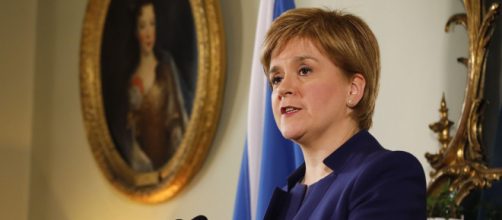Nicola Sturgeon is the current first minister of Scotland. She is also the leader of the Independence-minded Scottish National Party. The part promotes Scotland's secession from the United Kingdom, while maintaining its ties to the British monarch. While many of its voters don't necessarily support Independence, they like the party's single-minded focus on Scottish issues.
Whatever their reasoning for their votes, the SNP has become a dominant force in Scottish politics. But in the present state of things, their goal of Independence seems largely unattainable.
And other matters, including some of the party's social policies, have backfired on them lately. It now is also in need of a new leader.
Sturgeon stepping aside as first minister and party leader
Nicola Sturgeon is leaving behind the dual role of Scottish first minister and Scottish National Party leader. Though, according to the BBC, she does not intend to leave politics behind altogether, likely meaning she intends to remain a member of the Scottish Parliament.
Sturgeon has been a member of the Parliament since 1999. She has represented three different constituencies along the way, all of them Glasgow-based. Sturgeon first stood for a major elected office in 1992. That year, she ran in the United Kingdom general election in the constituency of Glasgow Shettleston.
She would lose to Labour incumbent David Marshall by a considerable margin. Shortly after, Sturgeon also unsuccessfully ran for a seat on the Cunninghame District Council.
Later, she followed that result with losses in race for the Strathclyde Regional Council and the Glasgow City Council. In 1997, Sturgeon was a general election candidate again, this time for Glasgow Govan. She lost to Labour candidate Chaudhry Mohammad Sarwar, who later became a prominent politician in Pakistan.
Quickly rose through the ranks at Holyrood
After joining the Scottish Parliament, Nicola Sturgeon was quickly named to the shadow cabinet. As time went on, she became the deputy leader of the SNP. When Alex Salmond became the party leader, he was not serving at Holyrood at the time.
As the highest-ranking party member in the Scottish Parliament, Sturgeon became the leader of the Opposition.
In 2007, the SNP narrowly prevailed in the Scottish Parliamentary election. Salmond won a seat in the body in the same election and as such became the new first minister. He named Sturgeon as deputy first minister and health secretary. She also later served as infrastructure secretary. Seven years later, Scotland voted on whether or not to leave the United Kingdom. Voters soundly chose to remain. Afterward, Salmond resigned as party leader and Sturgeon was chosen as his successor. Also effectively making her the new first minister of Scotland.
Sturgeon led her party to victory in the 2016 and 2021 Scottish Parliamentary elections.
As well as dominating performances in the 2015, 2017 and 2019 United Kingdom general elections.
Her tenure as first minister has spanned across five Conservative U.K. prime ministers. Her personal relationships with them have varied. Ranging from an apparently relative warmth with Rishi Sunak to open vitriol with Boris Johnson.
Previously practiced law
Nicola Sturgeon is a native of Irvine on the western coast of Scotland. Her mother, Joan, would later become a prominent politician in North Ayrshire. Sturgeon's father, Robin, worked as an electrician.
She would graduate from Greenwood Academy in Dreghorn, followed by the University of Glasgow School of Law. Sturgeon was further trained at the law firm McClure Naismith. Eventually, she worked as a solicitor in Stirling, Drumchapel and Glasgow.


